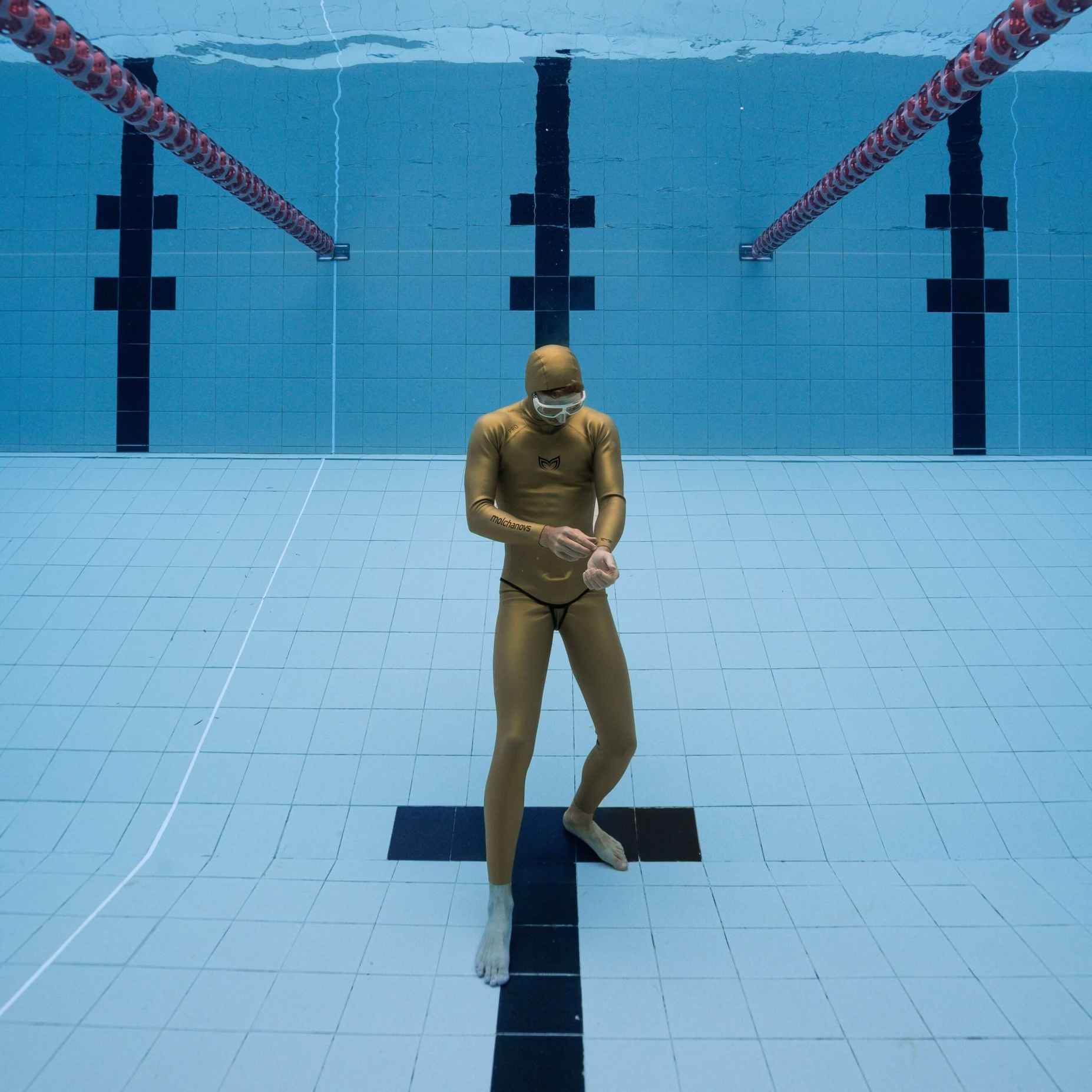The Mental Game of Freediving: Overcoming Fear and Building Confidence

Contributor: Patricia Paige Ong
At some point in your freediving journey, you’ll probably hear that freediving is only 10% physical - the rest is 90% mental. We totally agree.
Being fit and healthy is definitely helpful for freediving, and eating right and exercising will never hinder your progress. But your mental state is equally, if not more important!
I remember one of my own biggest challenges in freediving was switching to a nose clip. For shallow dives, I was absolutely fine - but the deeper I went and the darker it got, the darker the places my mind wandered to during dives. For a time, I feared some huge sea creature or drifting object would brush up against me and stress me out at depth, and this occupied a huge space in my brain on every dive, giving me early contractions.
But after plenty of discussions with other freedivers and a LOT of focus on mindfulness, I’m happy to say it’s no longer a problem!
This is absolutely not an uncommon story - every freediver has dealt with fear or anxiety at some point in their freediving, and you probably will, too.
I can hear you asking, “So then, how do you deal with this fear and overcome it?”
Let’s discuss!
Understanding Fear in Freediving

Photo credit: @akivis
There are a few very common fears among freedivers:
- Depth
- Drowning
- Darkness (especially in water with poor visibility)
- Marine life
- The unknown
The hormonal surge accelerates heart rate and breathing, creating three critical issues for freedivers:
- Quicker oxygen depletion
- Increased carbon dioxide build-up
- Impaired decision-making
Techniques to Overcome Fear

Photo Credit: @themacrowizard @fonsidiventures
Gradual exposure
Gradually exposing ourselves to fear-inducing situations and gaining confidence as we progress can be an effective way to deal with your fear. For example, if you fear depth, dive to a comfortable depth on the line until you feel no apprehension. Then, add in short hangs at that same depth. Once that starts to feels easy for you, increase the depth very slowly and repeat, repeat, repeat!
Visualization
Thoughts become things, and visualizing successful dives with positive outcomes can help bring them into reality. The key is to really see yourself in the dive. Imagine your entire dive from a first-person perspective or as if you’re watching yourself in a movie, and focus on every detail and feeling (a smooth duck dive, the texture of the dive line in your hands, the feeling of water against your face, etc.). This can reprogram your brain to associate diving with safety and enjoyment instead of fear.
Visualization is a technique taught in the Molchanovs Lap/Wave 1 - Beginner Freediving course.
Breathing exercises
Controlling your breathing can help reduce anxiety and calm your mind before dives. Techniques such as ‘box’ breathing, or 4-7-8 breathing, can lower a racing heart rate and promote a state of relaxation.
Breathing is so important (in life and in freediving) that freediving World Champion Alexey Molchanov created the Foundational Breathwork Base Training + program. This program can help increase lung volume and mobility, among other benefits.

Building Confidence Through Practice
Baby step your way to confidence! Setting and achieving small, incremental goals can help you build confidence over time. Remember, every victory (big or small) should be achieved, so new depths and mastering a new technique MUST be rewarded - celebrating progress reinforces positive experiences and builds confidence, after all. So go ahead and order that personal best (PB) cake!
Mental Preparation Before a Dive
Look to creating a personalized pre-dive routine that works for you. This can include things like stretching, breathing exercises, and/or visualization to help calm your nerves and focus your mind. This can create a sense of comfort and preparedness, which will reduce anxiety before a dive and set you on the path to greatness!
Click here to see how competitive freediver, Vice World Champion, and Molchanovs instructor Mikhail Bryantsev prepares for a maximum dive in the pool!
Staying Calm Underwater
Once we start feeling muscle tension and/or contractions, we need to go against our first instinct and relax even more - but how? The more tension you hold in your body, the more oxygen is burning and carbon dioxide is being created. Plus, you need to maintain control of your mental state!
For plain old static sessions, the ‘body scan’ is always a great option since we have all the time in the world to think. But for dynamic and depth dives, you can experiment with a few things and see what works for you.
Mindfulness

Photo Credit: @junglefreediver_diver @lizaulanova
If you can, try to stay in the present moment underwater by focusing on what you’re feeling. Concentrate on feeling the water flowing against your cheeks/hands/feet or the rope’s texture in your hands. You can also focus on sounds, like the sounds of waves splashing against your ears while you are relaxing at the surface. If your mind starts wandering, simply acknowledge it and try to focus again on the present moment. While it’s hard in the beginning, it does get easier with practice - make sure to train plenty on land (sitting on the floor or lying on your bed will do)!
Technique
Focusing 100% of your attention on your technique can center your mind with the added bonus of making you more efficient. When you’re starting to get feelings you don’t want to focus on, turn your attention instead of having flawless technique - and keep it there. Elongate your body so that you are streamlined, reach high for every single free immersion or no-fins arm pull, straighten your legs with every kick, etc. Pretend someone is filming you, and you want to look good for the camera!Mantras
Make a special mantra to say to yourself on every dive. For example, for a dive using bifins, you can repeat over and over again in your head, “Straight legs, equalize, relax your belly.” Pick what you want to focus on, important elements of your dive that require extra work. Similar to focusing on technique, saying a mantra can keep stray thoughts away while helping you concentrate on certain aspects of your dive.Attention Deconcentration
Attention deconcentration is a technique for advanced freedivers, which is taught in the Lap/Wave 3 - Master Freediving course. It’s defined as “a uniform distribution of attention in a field of vision or perception.” It’s the opposite of attention concentration, which involves isolating a perceptual image from the background. Successful attention deconcentration can increase your sensitivity and allow you to perceive many things simultaneously rather than focusing on specific elements.However, attention deconcentration is very difficult for beginner freedivers to achieve, which is why it’s only covered in our higher-level course materials.
Final Thoughts
The great Nelson Mandela once said, "I learned that courage was not the absence of fear, but the triumph over it."So while fear is to be expected when it comes to freediving, it definitely shouldn’t stop you. Instead, it should push you to face it head-on - after all, the things we care about most are usually the ones we've worked hardest for.
So approach every fear you have while freediving by remembering what fear really is, using the techniques listed in this post to conquer it, and building confidence through practice and relaxation through a pre-dive routine. Like we said before - physical training in freediving is important, but you absolutely cannot forget mental training!
For guided training, Molchanovs provides plenty of structured training options to help you progress:
- Base Training programs to guide your overall improvement
- Base Training + programs featuring world-class athletes to help you reach specific goals (like Alexey’s Foundational Breathwork program!)
- A Workout Generator for single-session workouts with a targeted objective
Not a Molchanovs freediver yet? Check out Base Training Induction Online to unlock access to BT and score discounts on BT+ programs!





Leave a comment